Bhishma:Birth; vow of Brahmacharya; boon to choose time of death
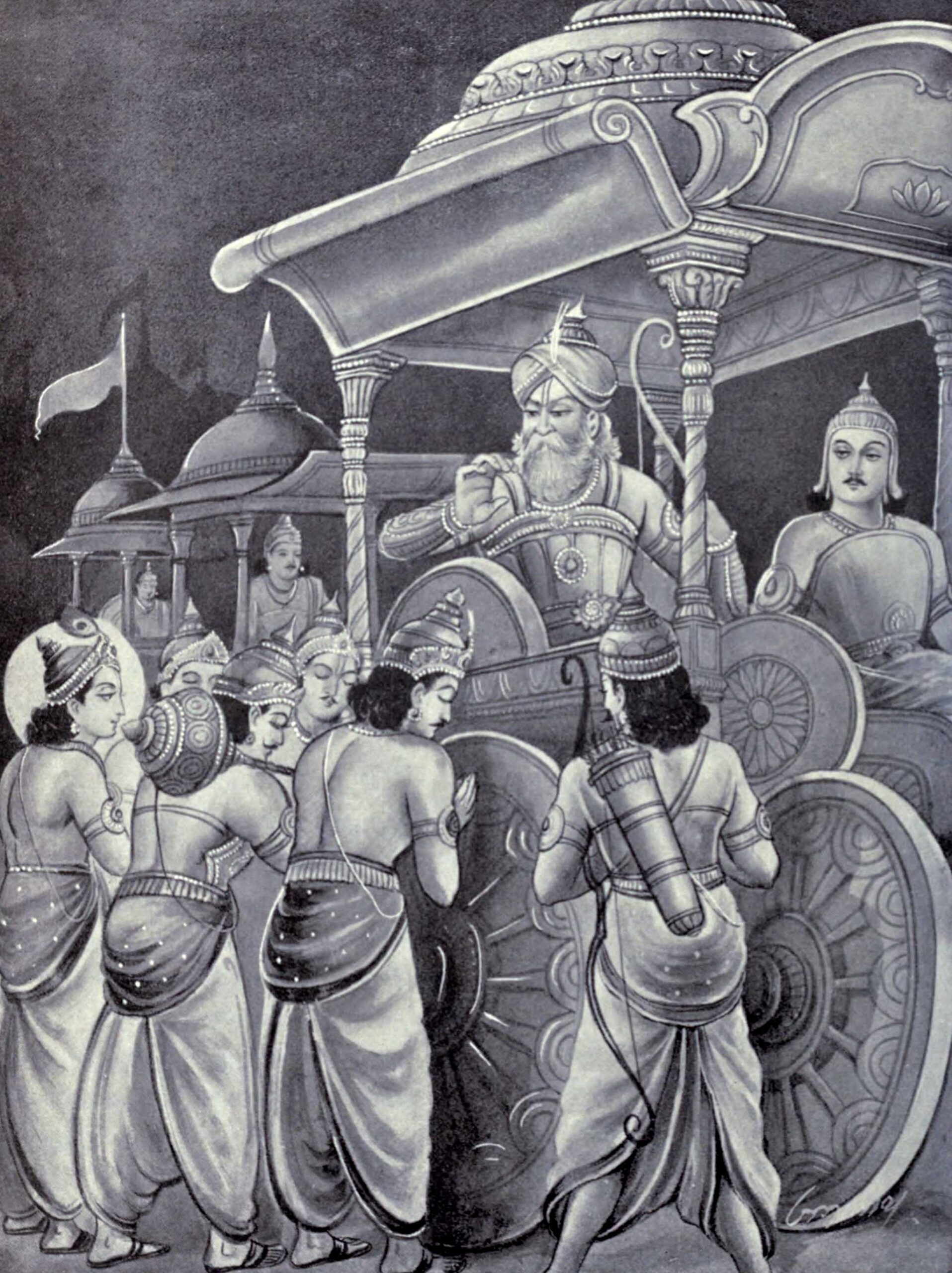
The story starts with a king named Mahabhisha, who was a great king; he followed his dharma and when his time on earth was over, he gained entry into heaven. One day, the gods, including Brahma, were gathered together for a ceremony, and it was attended by the goddess Ganga too. There was much excitement and all the gods gathered to greet Ganga when she arrived. The beautiful goddess Ganga was draped in white cloth and just as she arrived, the wind blew the cloth away from her body, leaving her vulnerable to the eyes of all the people who were present. As was expected, all present respectfully lowered their eyes; i.e., all except King Mahabhisha, who was so enthralled by Ganga, he neglected to look away.
Listen to the story on the Stories Of India Retold Podcast–Available on all major podcast apps. (Apple Podcast, Google Podcast, Spotify, Amazon Music, Audible, iHeartRadio, PlayerFM, and others!)
The gods were furious with Mahabhisha; especially Brahma. They did not take kindly to the fact that Mahabhisha failed to do the decent thing under the circumstances. Brahma punished Mahabhisha by telling him to go back to the mortal world and to earn his way back into the heavens one more time. So, essentially, as penalty for his transgression, Mahabhisha lost his spot on heaven but was promised reentry after one more cycle on earth as a mortal. Fortunately for Mahabhisha, he could also choose who he would be born as and after careful consideration, he chose to be born as a son to King Pratipa, who was a king belonging to the Puru lineage.
The story of Bhishma’s birth and his vow to be childless is told in the Sambhava Parva of the Mahabharata.
As commander of the Kuru army and the grand-uncle to both the Kauravas and Pandavas, Bhishma is one of the main protagonists of the story. The son of King Shantanu and goddess Ganga, he was named Devavrata at birth. In Indian culture, Bhishma is widely loved and admired because of his dedication to dharma and his selflessness.
This is the story of the events leading to Bhishma’s birth; why he chose to step down as the heir apparent and made the vow to never have children of his own; how he was granted the boon that he could choose the time of his death.
As for Ganga, she too was shaken by what had transpired in the gathering. She was curious about Mahabhisha. Thoughts of Mahabhisha occupied Ganga’s mind, even on her way back home, she couldn’t put him out of her mind. Ganga was still thinking about Mahabhisa when she came across the eight Vasus.
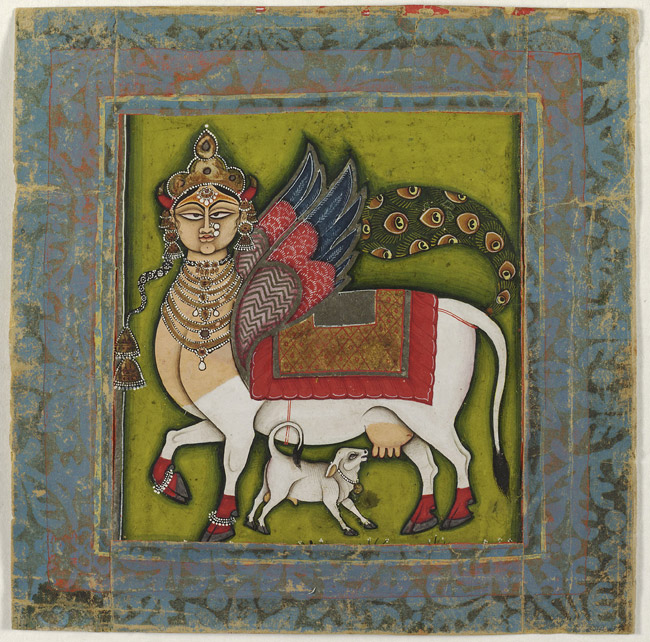
There are eight Vasus, they are of noble birth being the children of Brahma. They are generally collectively referred to as the ashta-vasu or eight vasus. They are deities representing the different elements–earth, water, Fire, Wind, sun, sky, moon and the stars. Long story short—one day, the vasus were having a picnic of sorts in the forest, they saw a very healthy-looking, beautiful cow. The vasus, led by Prabhasa, who is the deity representing the sky, steal the cow.
Cattle stealing was a common practice in those days; however, that particular cow was actually a divine cow and it belonged to a very powerful sage named, Vasishta and the Vasus were aware of the fact. Vasishta was angered by their actions and he cursed them all to be reborn as mortals. The Vasus begged for mercy and Vasishta compromised by letting all except Prabhas—who planned and led the theft—to return back to heaven a short time after their birth.
The Vasus were inconsolable. They could not imagine a worse punishment. They pleaded with Ganga to help them. They begged her to give birth to them.
“If we have to be reborn as a mortal on earth, we would prefer to be born to you,” they told her.
Ganga agreed.
The Vasus decided that the son born to King Pratipa should be their father. Since Ganga knew Mahabhisha would be reborn as Pratipa’s son, she was happy with the Vasu’s choice and gave her consent. The Vasus made yet another request—they told Ganga that they did not want to spend any more time on earth as a mortal than necessary and so she should make sure to end their suffering by throwing them into the water immediately after their births. Ganga stated that she wanted her husband to have an heir so she would spare one child. In return, each of the Vasus promised 1/8th of their energies to the child who would survive but warned Ganga that her son himself will remain childless in his lifetime. In this way, Ganga and the Vasus came to an agreement.
Ganga had a plan. One day, Ganga met Pratipa whilst he was performing meditation on the banks of the river Ganga. Ganga approached him, introduced herself and offered to marry him. King Pratipa very politely declined. But Ganga was a very powerful woman and you don’t simply refuse a woman like that, so he offered her the hand of his son instead. Ganga accepted; but she laid down a few conditions of her own as part of the deal. Her conditions were:
- Her husband must not know her real identity as a woman of high birth;
- Her husband must never question her actions.
Ganga declared that as long as her husband will adhere to these 2 conditions, she will live with him happily.
As prophesized, a son was soon born to Pratipa. We now know that Mahabhisha was destined to be reborn as a son to Pratipa. The little prince was named Shantanu. When Shantanu grew older, King Pratipa decided to hand over the kingdom to his son and retire to the forest. Before departing, Pratipa told Shantanu about the promise he had made to a beautiful lady who would marry Shantanu and have his children. Pratipa also told Shantanu about the conditions she had insisted upon and instructed Shantanu to follow them carefully.
A few years passed. One day, King Shantanu was walking along the banks of the river Ganga, when he came across Ganga. Just like in his previous life, Shantanu was completely enthralled with Ganga’s presence and beauty.
Shantanu approached Ganga and spoke to her. He wanted to know more about her. He sang praises of her beauty and asked her who she was.
“Be my wife,” he told her.
“I will accept your proposal; but only if you promise me to never interfere or stop me from what I must do; and you must never yell at me,” Ganga laid out her conditions.
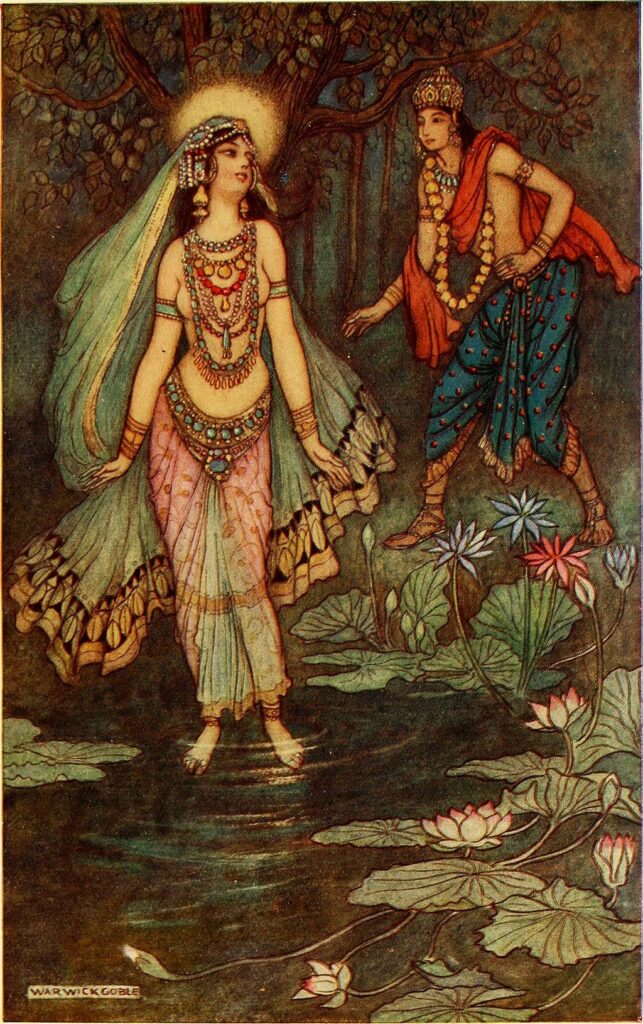
Shantanu accepted and they were soon married. Shantanu and Ganga loved being with each other and enjoyed each other’s company. Shantanu was extremely careful to never question Ganga’s actions. Even when Ganga threw their newborn sons into the water, Shantanu remained silent. Each time she killed their child, Ganga consoled Shantanu saying that she was doing it all for his own good.
Things changed when their eighth son was born. Shantanu could not bear it anymore. “Stop it,” he told Ganga. He called her names. He questioned her about her origin and why she was killing their newborn babies.
“You can have this baby,” Ganga told Shantanu calmly, in response to his outburst. “However, I cannot stay here with you any longer. I told you I would leave the moment you question my motives or yell at me. That time is now.”
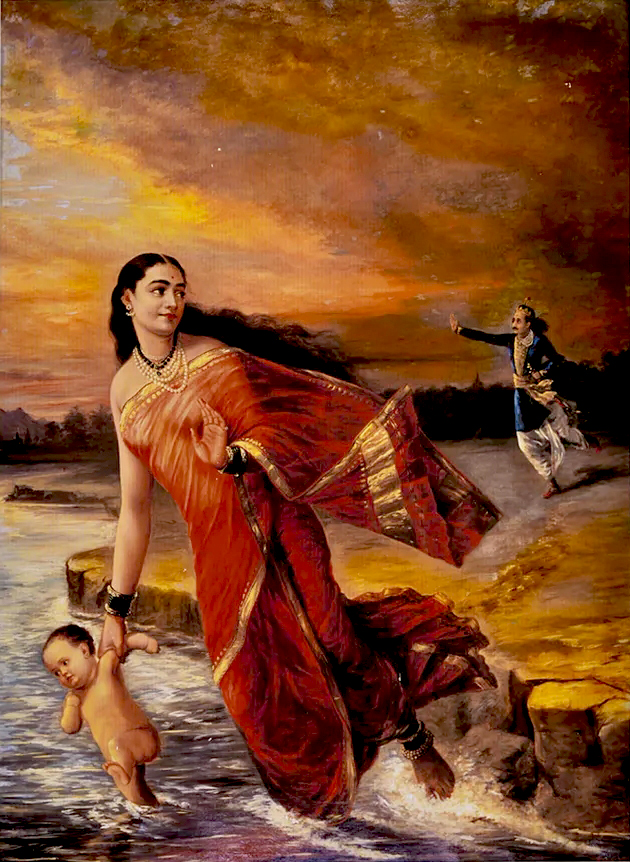
Ganga also provided Shantanu with answers to all his questions—she told him the truth about who she was; about the Vasus and sage Vasishta’s curse; the reason she married him; and the reasons she had to kill their children.
With a promise to King Shantanu that she would return him his son back at an appropriate time, Ganga took her son and left her husband. Ganga named her son as Gangadatta (or given by Ganga); he was also known as Devavrata and Gangeya.
Shantanu was saddened when his wife and son left him, but there was nothing he could do about it and he had to just wait for Ganga to give back his son and heir when the time was right.
Years passed. Shantanu was a successful king, and like his father before him, he ruled the earth justly and protected his people. But he was older now and was ready to retire. One day, he was out hunting in the forest. He followed the trail of the deer he had shot and arrived at the banks of the river Ganga, where he saw a young man using his arrows to dam the river Ganga. Shantanu marveled at the boy’s abilities, he wanted to know who the boy was but the boy disappeared before Shantanu had a chance to talk to him.
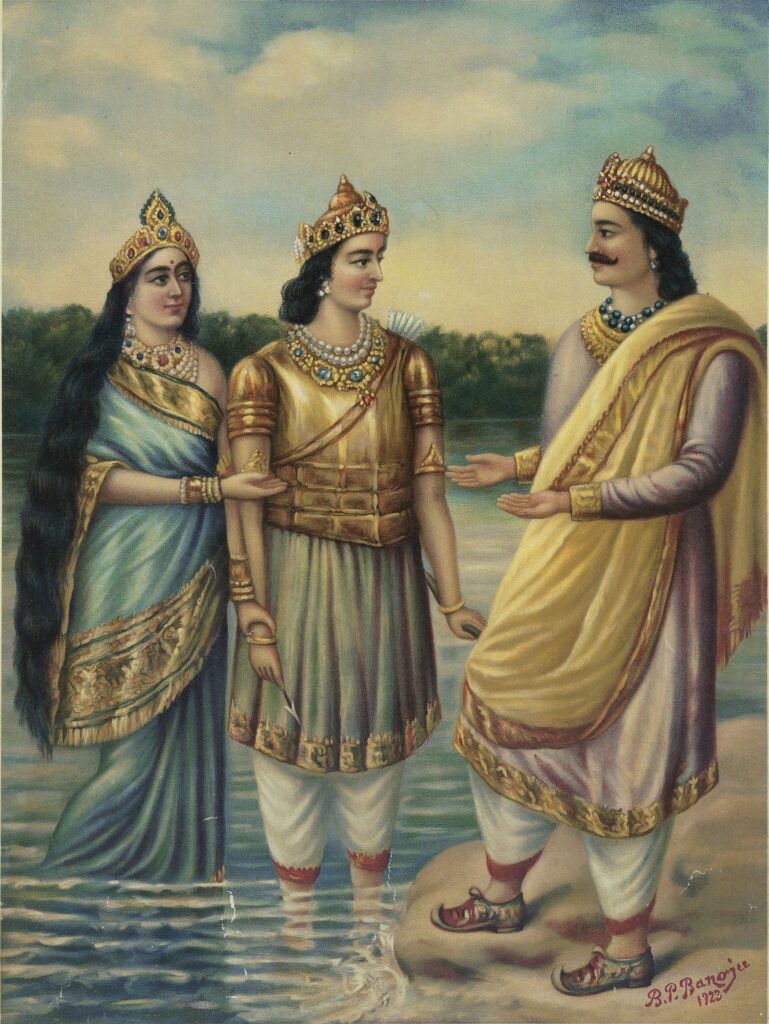
Shantanu had gotten a look at the boy and he had seen what he could do. Suspicion niggled at the back of Shantanu’s mind. He wanted to check something for himself. He went to Ganga and asked her about their son.
Shantanu was happy when his suspicions were proven right. Ganga presented Shantanu with their son—the same boy whom Shantanu had seen earlier at the river bank—and told him that their son was now ready to be with his father and assume his place as the heir to the throne. Ganga told Shantanu that their son had studied under the great sage Vasishta and received the education due to a prince. He was well-versed in the Vedas and other sacred texts, philosophy, the art of warfare and weapons; and was particularly good at archery.
The newly reunited father and son returned to the capital city of Hastinapur. To Shantanu’s delight, Devavrata adjusted to his new home easily. He was very likeable and had a charming personality, he won over all of the people in his new family and his father’s court and was happily accepted as the heir apparent.
A few years after Shantanu had appointed Devavrata as his heir apparent, he was out in the forest, which was situated near the River Yamuna. While he was walking along the banks of the river Yamuna, he met a beautiful woman, who was working on a fisherman’s boat. Her name was Satyavati. Satyavati was the daughter of the head of the local fishermen tribe. She was beautiful, charming and Shantanu was completely taken by her. Shantanu went to her father and asked for her hand in marriage.
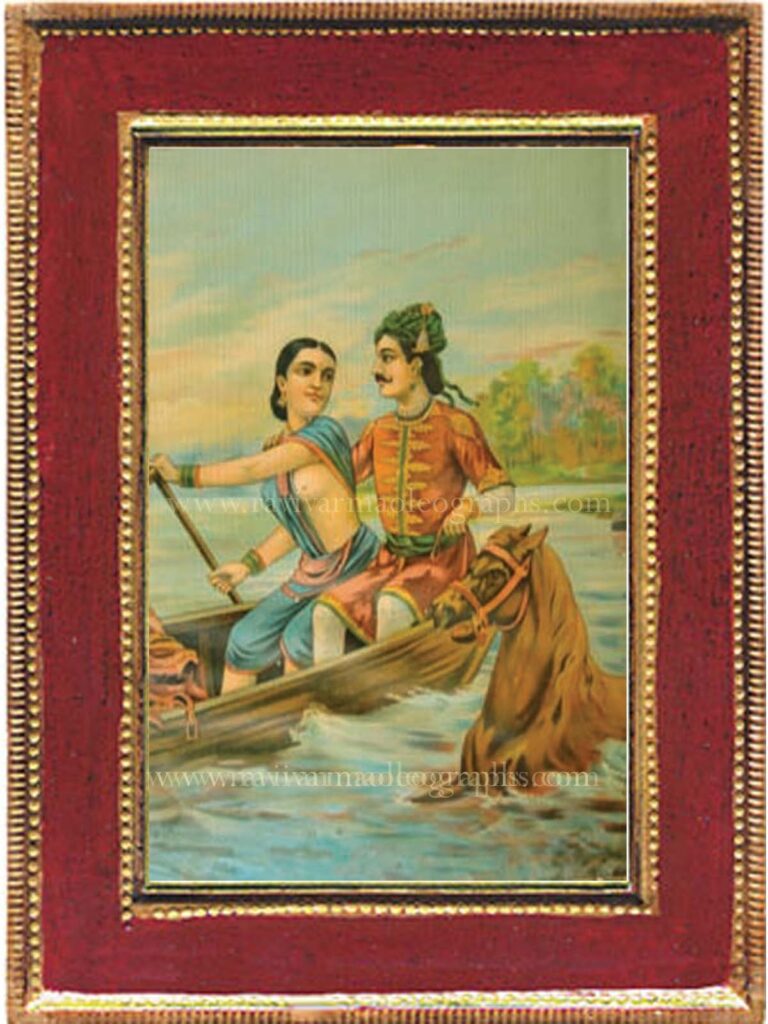
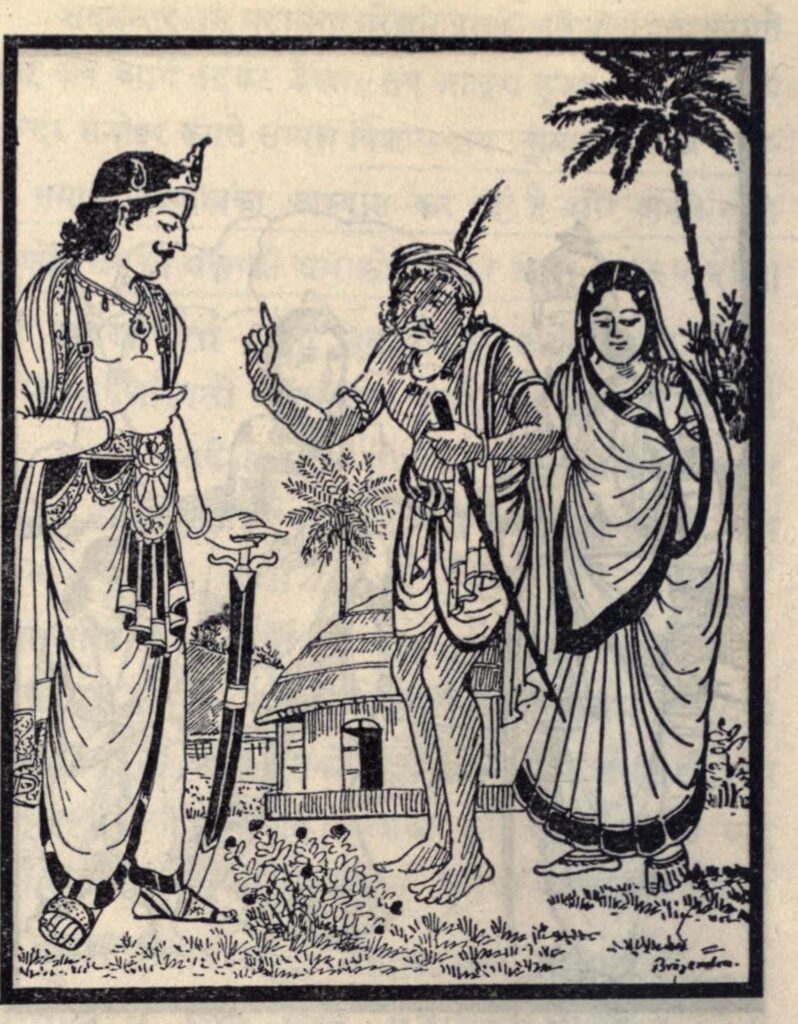
Satyavati’s father was very interested in this most advantageous match; however, he told Shantanu that for him to agree to this match, Shantanu must promise that the son born to him by Satyavati would be made the heir. Shantanu was completely in love with Satyavati but what her father was asking was impossible. He already had an heir, that topic was not up for negotiation. He was heartbroken.
Back at his palace, Shantanu continued to nurse his broken heart. The fact that his father seemed sad and withdrawn did not escape Devavrata’s notice. He asked his father what the matter was. Shantanu tried to brush-off his son’s concerns, but when Devavrata pressed him for answers, he said, “I am worried about the fact that you are my only heir. Life is so unpredictable; if something were to happen to you, our line will end and the future of our kingdom will be in peril. These are the kind of thoughts that keep me up at night.”
It sounded like an honest confession. However, Devavrata was not convinced. He suspected that something else was going on with his beloved father. Devevrata met with an old friend and advisor of his father and asked him the truth about why his father seemed sad. The advisor told Devavrata all about Satyavati and about her father’s demands.

After gathering all the facts about the situation between his father and Satyavati, Devavrata, along with some of his trusted court advisors, traveled to meet Satyavati’s father.
“I am here to arrange the marriage of my father with your daughter,” Devavrata told the head of the fishermen tribe. “I understand that you had some conditions for the match. I personally guarantee you that all your conditions will be met and Satyavati’s son will inherit the kingdom.”
Satyavati’s father wasn’t convinced. “That is all well and good. But. What happens when your sons feel differently?” he questioned Devavrata.
Satyavati’s father drew a hard bargain. Devavrata wanted to make sure his father was happy and was willing to do whatever it took to make sure his father could marry Satyavati. “Then I promise you that I will never have children and will take up brahmacharya from this day forward,” Devavrata declared.
Satyavati’s father was finally convinced. Satyavati went to the capital with Devavrata and the other members of court. Shantanu was reunited with the woman he loved and they got married. When Shantanu learned how his son had convinced the tribal chief, and the sacrifices Devavrata had made for his sake, he was grateful for what Devavrata did and was in awe of his son’s selflessness and loyalty. Shantanu named his son Bhishma, which means terrible or fierce, because he took such a terrible vow.
As a show of his appreciation for Bhishma’s selfless actions, Shantanu awarded him a boon that Bhishma would have the ability to choose the time of his death.
-The End.
Visit The Stories Of India Retold Podcast to listen to the story and to learn more about Bhishma. Available on all major podcast apps.
References:
The Mahabharata 1: Complete and Unabridged; translated by Bibek Debroy. (2015). Penguin Random House India. (Original work published 2010)
Images:
Bhishma – Unknown artistUnknown artist, Public domain, via Wikimedia Commons
Kamadhenu- unknown, India, Public domain, via Wikimedia Commons
Shantanu meets Ganga – Internet Archive Book Images, No restrictions, via Wikimedia Commons
Ganga takes bhishsma- Raja Ravi Varma, Public domain, via Wikimedia Commons
Ganga presents devavrata – Bamapada Banerjee, Public domain, via Wikimedia Commons
Shantanu Satyavati boat- Raja Ravi Varna, Public domain, via Wikimedia Commons
Shantanu refused by fishermen’s king – Ramnadayandatta Shastri Pandey, Public domain, via Wikimedia Commons
Bhishma and fisherman- Raja Ravi Varma, Public domain, via Wikimedia Commons
- Ekalavya–Life and Death of the Prince of Nishadas
- Dhritarastra, Pandu, Vidura: Birth; the struggle to revive a dying lineage.
- Satyavati: Origin; Boon of sweet fragrance; Mother of Veda Vyasa (Mahabharata)
- Ashta Vasu :Vasishta’s curse; rebirth as mortals(Mahabharta)
- Bhishma:Birth; vow of Brahmacharya; boon to choose time of death
- ©storiesofindiaretold copyright 2022 all rights reserved
